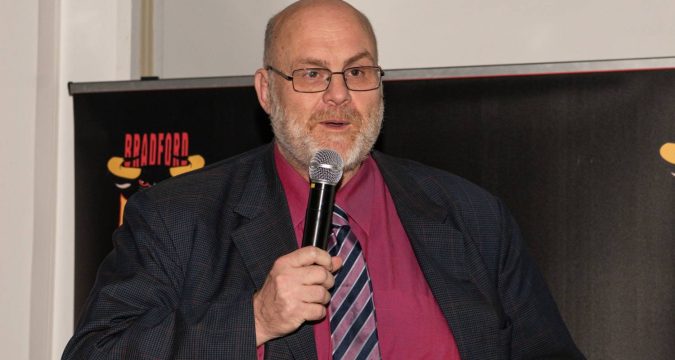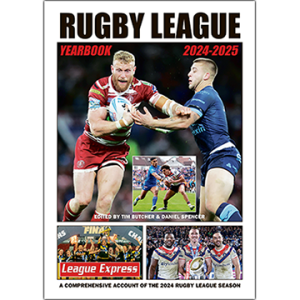
NIGEL WOOD back to the RFL, Gary Hetherington to London Broncos, Marc Sneyd to Warrington Wolves, Matty Nicholson scoring two tries on his NRL debut, Hull FC springing the shock of the season by going to Wigan and recovering from a 22-6 half-time deficit to win 26-22 and Dylan Brown to Newcastle Knights on a record-breaking NRL contract.
It’s fair to say that it’s been a busy seven days since the last issue of League Express.
So let’s start at the top.
Not every Rugby League supporter has welcomed the return of the RFL’s former chief executive Nigel Wood to the RFL, albeit as the interim Chairman rather than the CEO.
But I think it’s also fair to say that Wood’s previous tenure at the RFL, from 2001 to 2017, initially as the finance director but latterly as the CEO, is widely misunderstood.
His main achievement was to stabilise and then strengthen the RFL’s finances, the highlight of which was when he negotiated a five-year broadcasting deal with Sky Sports that generated £40 million per year.
Another major achievement was his role at tournament director of the 2013 World Cup, with 14 nations playing in front of very good crowds throughout the country and the tournament itself making a profit of around £3.7 million.
That contrasted sharply with the World Cup that was played nine years later, also in this country, despite Wood persuading the former Chancellor of the Exchequer George Osborne to allocate £25 million of government money to support the tournament.
Nigel left the RFL at the end of 2017, so he had nothing to do with the 2022 tournament, which actually lost money despite that government support. I suspect that if he had still been the RFL CEO, the tournament would have been better planned and would have made a profit.
And, after Wood had departed, Robert Elstone was appointed on a very high salary as Super League’s chief executive.
One of the decisions made at that time was to appoint Rothschilds Bank to find a private equity investor for Super League.
That decision cost the Super League clubs a search fee of £850,000 payable to Rothschilds for finding Novalpina, a private equity company that proposed to invest £60 million but which was fortunately rejected by the Super League clubs, as it soon went into liquidation a few months after being rejected by the clubs.
Again, I can’t imagine that a foolish and expensive decision like that would have been made if Nigel had still been the CEO.
In one sense Nigel is inheriting a poisoned chalice, with a great deal of uncertainty surrounding the RFL’s and therefore the clubs’ future income streams.
Like all organisations that depend on a large proportion of their income from one major source, Rugby League is extremely vulnerable to the vicissitudes of the Sky Sports TV contract.
Currently standing at £21.5 million per year, the RFL needs to reverse the decline in broadcasting income when the next broadcasting contract begins in 2027.
Whether or not Rugby League remains with Sky, that will be a massive challenge.
In addition to that, Nigel has to find a way to keep Salford competing throughout the Super League season.
And he also has to get the details of the Ashes Test series announced – they are currently being held up by discussions between the Australian Rugby League Commission and the Players Association, apparently – and he has to find a way to fill Wembley and the other Test venues.
I don’t envy him.
READ: Nigel Wood sets out his priorities on RFL return
Where is the mea culpa?
THE move to unseat Simon Johnson as the RFL Chairman, with three other female RFL directors all resigning roughly at the same time, has been met with alarm by some observers.
Dr Cherrie Daley and Julia Newton, who jointly announced their resignations on Friday, claim that the moves by the clubs to unseat Simon were “contrary to proper governance”.
“Whilst we are sad to leave the RFL Board and the sport, given recent and current events, we feel there is no other option,” they wrote.
“As Directors, with the responsibilities carried, we have set out why recent moves have been contrary to proper governance and, having outlined potential effects, feel that we must step down.”
The directors apparently made that claim in the papers sent out in advance of the aborted RFL Council meeting last week.
But let’s consider this issue head on.
The four directors who have resigned clearly all feel unhappy with the recent course of events, just as we would expect them to. No directors of any organisation likes to be told that the members lack confidence in them.
But that’s a very different matter from claiming that such a move is contrary to good governance.
In any organisation’s governance, there has to be a mechanism for removing directors with a vote of no confidence. Otherwise we would have a dictatorship with absolutely no accountability.
The clubs in membership of the RFL decided collectively that they no longer had confidence in the RFL Chairman. That is their right, which they duly exercised and is provided for in the rules and regulations of the RFL.
It would be perfectly possible for someone to question their wisdom in doing that, but not their right to do it.
So I’m not quite sure what the two outgoing directors are getting at.
And what disappoints me is that there is absolutely no sign of any humility in anything that the departing directors have said about themselves.
If I were the RFL Chairman, for example, and I lost a vote of no confidence, I suspect that I would want to acknowledge the things that had gone wrong and that had led to that vote by the clubs.
But that sense of mea culpa seems to be wholly lacking from all the directors who have departed the RFL Board.
Some people might claim that that attitude suggests a touch of arrogance, and perhaps it illustrates why the clubs voted as they did.




